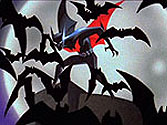 |
 King's
Ransom
King's
Ransom
Riven
by jealousy and dissension, the Royal Flush Gang begins to unravel.
Original Airdate: September
16, 2000
Episode # 42
Rating: * * * *
|
||
|
|
|
| Credits | Cast | |
Written by Rich Fogel Directed by Butch Lukic Music by Shirley Walker Animation by Koko/Dong Yang |
Will Friedle as Terry McGinnis Kevin Conroy as Bruce Wayne Angie Harmon as Barbara Gordon George Lazenby as King Sarah Douglas as Queen |
Nicholas Guest as Jack Olivia d'Abo as Melanie Parker Stevenson as Paxton Powers Gabrelle Carteris as Sable Thorpe Sean Donnellan as Virtual Anchor |
|
|
|
This is not to say that the show's producers accept the troubling proposition that children should not be presented with challenging material, or the ludicrous proposition that comics and cartoons are not worthy vehicles for subtle treatments. (Again, BTAS and TNBA refute even the suspicion that this is the producers' belief.) But with Beyond's emphasis on surface conflict and surface morals, it does mean that the writers have a harder time working elements of depth and interest into their stories; almost of necessity, the ratio of eye candy ("Ace in the Hole" or "Joyride," say) to intellectual bundt cake is pretty high. But it should also be recognized that such constraints are not entirely a bad thing, either. If on BTAS the writers had more freedom to engage in thoughtful stories they also had more freedom to engage in the pseudo-profundities of "I Am the Night" and "It's Never Too Late," episodes that apparently thought we couldn't understand what made a character tick unless he sat down and told us, at length, with footnotes, reference lists and illustrated diagrams. With no time for yammering, an ambitious Beyond writer must rely on implication and intimation to get any deeper concerns across, and give every action or sentence a second or even third meaning, one sometimes hidden even from the characters themselves. It's a tricky business, to be sure. The attempts do not always come off successfully, and even when they do it will be only for an audience prepared to watch with a receptive and searching intelligence. But those successes, such as "Heroes" or "A Touch of Curare," are magnificent in execution and not only concept. This is because it is always more satisfying to catch an implication yourself, to tease out the meaning behind a story, than to have it shoved impatiently into your face. Because things are implied rather than said, an audience for such a story will have to come to it with a great deal of background information already in place. An appreciation of "Heroes," for instance, already presupposes knowledge of comics in general and the Fantastic Four in particular, just as "A Touch of Curare" presupposes an extensive appreciation of Wayne's relationships with the various Gordons. "King's Ransom" makes no sense without seeing "Dead Man's Hand" and "Once Burned," and if those episodes in isolation remain unsatisfactory, they are amply justified by the way they contribute to the artfulness of the third in the trilogy. "King's Ransom" honors the classic noir conceit that every promise justifies its own betrayal; that every action springs from a hidden motive; that no plot can ever climax in a final twist. Indeed, it bests even the crime thrillers of the 30s and 40s in the density of its development, packing more twists and surprises into twenty minutes than the classic melodramas could in ninety. Nor does it reduce to a bloodless exercise in narrative architecture: Anger and humiliation are given their just due, but are never overdone, and in one brief, allusive exchange between Ten and Batman, more pain and anguish is squeezed out than in the entire length of "Once Burned." And, paradoxically, it achieves its greatest tragic depth because it develops and never abandons a sympathy for even the putative villains. Unlike most noirs, in this one corruption and betrayal are not made faceless, or endemic, or rooted in simple malice, but are motivated by the very real emotions of fear and resentment. So Paxton Powers goes from villain to victim to villain to victim with such frequency that each role comes to seem arbitrary, due solely to the way that the others in the story choose to treat him. And when the King cries out to Batman "You don't know what it's like to live in somebody's shadow" the two almost become one, so that we cannot escape the thought of how easy it would be for even our hero to turn. |
|
|
|
|
Related
Episodes |
What
Others Are Saying ... |
|
|
| Back
to Joyride |
Forward
to
The Last Resort |